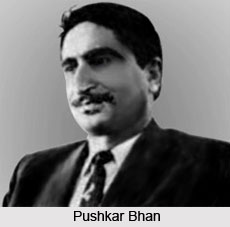 Pushkar Bhan was born in Srinagar in the year of 1925. He was a famous dramatist, director and a scriptwriter who acted in many plays too. Right from his childhood, he exhibited interest in becoming a playwright and an actor. After receiving his Bachelor`s degree in 1947, the year of India`s independence from British rule, Pushkar Bhan became associated with the Cultural Forum of the National Cultural Front, and, in this capacity, acquired unprecedented acclaim under the leadership of Dinanath Nadim, the foremost luminary of new cultural awareness in Kashmir. Pushkar`s plays, Lalkar in Urdu and his `Ya Tan Ya Tadakh` received captive public attention. His acting roles in Nadim`s Bombur Yamburzol, also in Shahid Sherwani and Yeh Kashmir Hai, and many others, won high praise from audiences everywhere.
Pushkar Bhan was born in Srinagar in the year of 1925. He was a famous dramatist, director and a scriptwriter who acted in many plays too. Right from his childhood, he exhibited interest in becoming a playwright and an actor. After receiving his Bachelor`s degree in 1947, the year of India`s independence from British rule, Pushkar Bhan became associated with the Cultural Forum of the National Cultural Front, and, in this capacity, acquired unprecedented acclaim under the leadership of Dinanath Nadim, the foremost luminary of new cultural awareness in Kashmir. Pushkar`s plays, Lalkar in Urdu and his `Ya Tan Ya Tadakh` received captive public attention. His acting roles in Nadim`s Bombur Yamburzol, also in Shahid Sherwani and Yeh Kashmir Hai, and many others, won high praise from audiences everywhere.
His early plays namely Dwadi Majnun i.e. `Milk-like Majnun`, Tan tadakh i.e. `Thunderstorm`, and Yuth lwakichar i.e. `This Childhood` became very famous as part of the Jammu and Kashmir Cultural Congress movement in 1950s. The three plays that he wrote in collaboration with Som Nath Sadhu namely Grand Rehearsal in 1967, Chapath or `Slap` in 1973, and Nev Nosh or `New Bride` in 1975 was performed a number of times and he played central parts in all three. His finest original contribution is the play Machami in 1970, which he produced successfully on stage and then broadcast as a serialized radio drama. Machami, or Hero Machami, is perhaps the most popular Kashmiri play, for its melodramatic fantasy and Bhan`s role as Machami. He also launched the first daily radio feature in Kashmiri, Zuni Dab, which won him the Padma Sri in 1974.
In addition to the Padamshree award, Pushkar Bhan won other notable awards, Sahitya Akademy Award in 1976, NEETA (I.C.C.E) in 1985. Jammu and Kashmir State`s Academy of Art and Literature honored Pushkar Bhan with awards for his plays Chapath, Nev Nosh and Bhavya Purvabhyas. In addition, he has had the distinction of winning the Sadiq Memorial Award for Best Actor and Best Playwright. Pushkar Bhan`s distinctive and undying fame rests on the lead roles he played in Myanzirath and Shayire-Azam Mahjoor. Pushkar Bhan had the distinction of working with famous Indian actors like Balraj Sahni and Parikshit Sahni. The film based on the life of the Kashmiri poet, Mahjoor, won the President of India`s Gold Medal for its excellence.
After his retirement from government jobs, and acting, Pushakar took up writing as a dedicated pursuit rather than a post retirement hobby. His writings have continuously appeared in various journals such as Inklab or `The Revolution`, Aieena or `The Mirror. Both of these were published in Mumbai, as well as Sheeraza and Kongposh, published in Jammu and Kashmir. Pushkar Bhan`s contributions to the genres of Satire and Humor in Kashmiri Prose Literature are immense. As a matter of fact he elevated the different genres to the standards of universal excellence. His work, Machama, which won a Literary Award from the Sahitya Akademy, has been the source of 73 plays broadcasted from the Akashvani Radio`s Srinagar Channel. In this highly popular Series, the main character role of Machama was played by Pushkar Bhan himself. Another important work, Sanya Bacha or `Our Children`, won an award by NEETA. This work makes a significant contribution to knowledge about how Radio Broadcast Programs can aid in the education, entertainment, and learning of children.
Pushkar Bhan gained immense popularity when the first Television Broadcasting Channel was established in Srinagar. He was very popular among viewers for his Laughter-Satire series, Doctor Zero. His play, Inklab, received high acclaim when it was televised by the Patna Channel. In present days Pushkar Bhan is living with his son in Patna. In his exile, he has already written more than 30 episodes of Rangan Hyendi Rang i.e. The Color of Many Colors, televised by the Srinagar Channel as a Serial Drama.
The great theatre personality, Pushkar Bhan died on October, 2008 at the age of 83 leaving behind a rich legacy of his eternal creations.




















